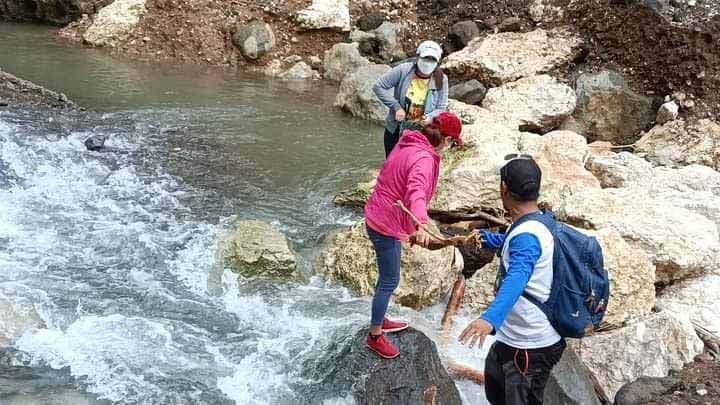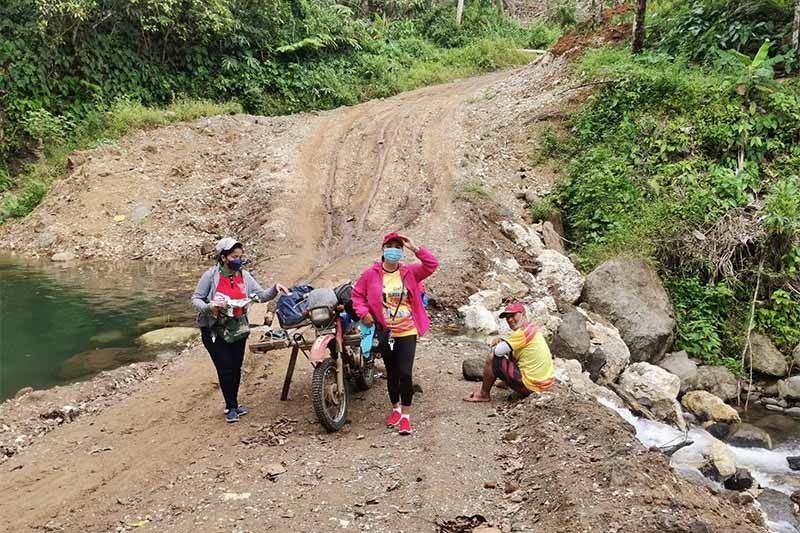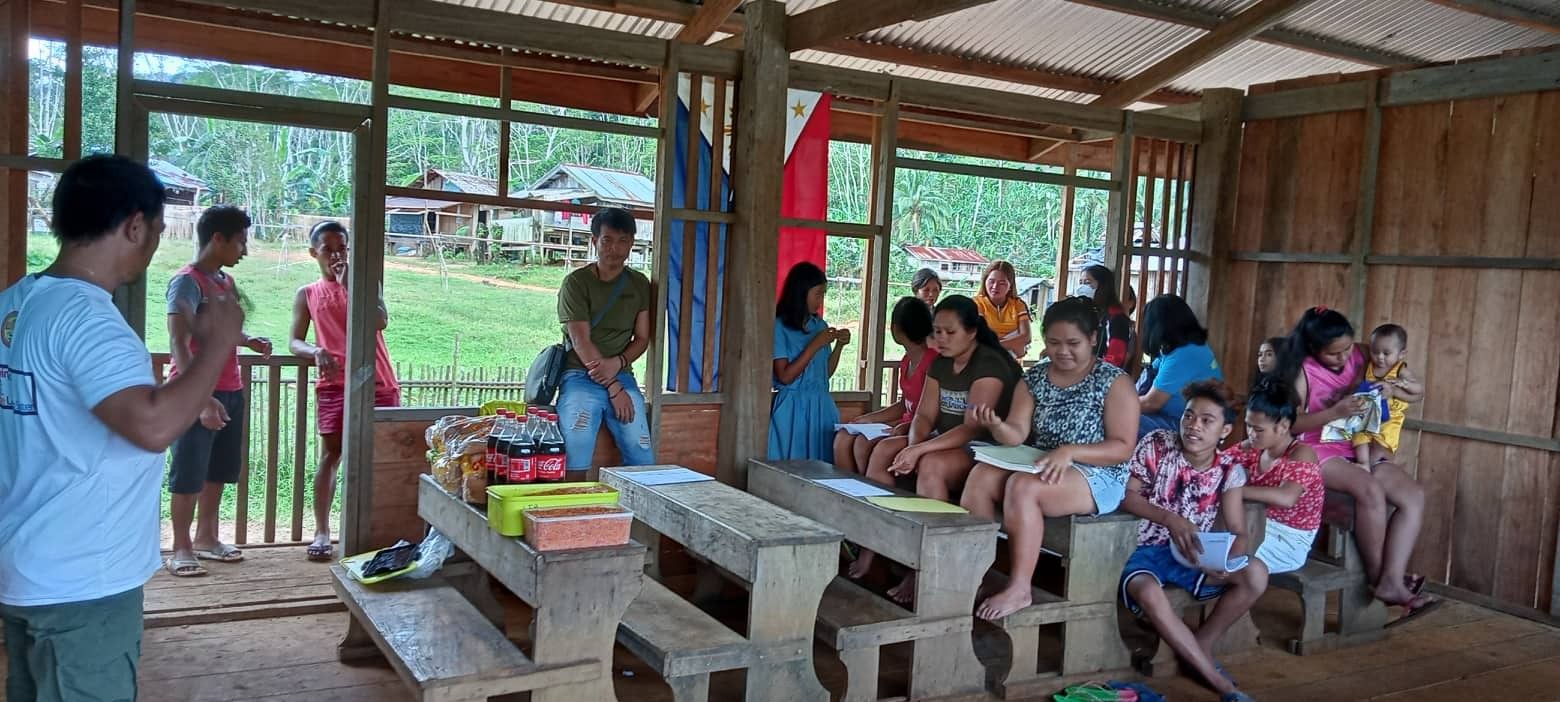As fuel costs soar, alternative learning teachers lose touch with students

MANILA, Philippines — When Sheila Oñedo-Villena read the news of another oil price hike in June, she sent an apology to the group of 43 adult students who have been waiting months for her to start their first lesson.
These 43 members of the Iraya-Mangyan community, who live high up a mountain in a sitio in Oriental Mindoro, personally requested Oñedo-Villena and a co-teacher to teach them to read and write.
But after fuel prices went up — and habal-habals, private motorcycles that are the only available mode of transportation in Sitio Adong, began to charge P300 roundabouts — Oñedo-Villena and her co-teacher had to postpone teaching the group and prioritize students closer to home.
Oñedo-Villena works as a teacher in the Alternative Learning System (ALS), the Department of Education’s (DepEd)’s parallel learning system that deploys teachers to reach out-of-school youth and adult learners with no access to formal schooling. ALS offers a basic literacy program and elementary and secondary education.
Turning down the request of 43 adults eager to learn basic literacy pained Oñedo-Villena, but she could not afford to stretch her salary to service five barangays assigned to her.
In that sitio, Oñedo-Villena could only schedule a weekly delivery of printed modules for elementary and high school level students.
"You can’t teach basic literacy through modules. We told them we would get back to them once everything is okay, once we can afford going to their place," Oñedo-Villena said in Filipino.
Waves of oil price hikes in June have driven up fare costs for habal-habals — an ALS teacher's ride of choice in geographically distant areas where there is no public transportation.
This has constrained teachers’ budgets, forcing some to consider limiting their weekly visits to the more distant barangays, which would cut off precious class time for out-of-school youth and adult learners.
Worse, several ALS teachers have yet to receive DepEd’s monthly transportation allowance of P3,200, which is intended to “defray the expenses on transportation that the ALS Teacher shall incur to reach learners in the underserved and unserved communities.”
ALS teachers interviewed by Philstar.com said that while canceling their face-to-face instruction could save them some money, relying on modules alone can’t guarantee a student will manage to stay on track.
For those for whom formal schooling is inaccessible, earning their school credentials through the ALS program opens doors for moving up to higher education or employment.
Philstar.com reached out to DepEd Bureau of Alternative Education Director Marilette Almayda for comment but has not received a response as of this post.
Habal-habal rides eat up a teacher’s salary
With every peso added to fare costs, ALS teachers feel the impact of the pump immediately, as most visit four to five barangays weekly.
Oñedo-Villena is one of three teachers assigned to 13 barangays in San Teodoro, Oriental Mindoro where they teach a mix of elementary and high school subjects, as well as basic literacy, to out-of-school youth and adult learners.
To save costs, she and her co-teacher ride a single motorcycle to one barangay weekly. Both pitch in P100.
In total, Oñedo-Villena spends P300 to P500 a week going to five barangays. She earns about P29,000 under Salary Grade 13.
"Before, P50-worth of gasoline a day could get me to one area. A full tank for my motorcycle would only cost P175. Now it’s P400 for a full tank," Oñedo-Villena said.
Since most of her students don’t have the means to purchase notebooks and papers, the crafty teacher said she buys them from the nearest store, which is almost two hours away by jeep.
She added that most of her students dropped out of formal schools due to financial hardship and the schools’ distance from their homes. Her adult learners, including the 43 she has yet to teach, mostly earn their income through kaingin and mining.
"I don’t even compute how much I spend for my students anymore. It’s difficult," Oñedo-Villena said.
Similarly, Rosa Olimboyong, a mobile teacher from Surigao Del Sur, said she spends P990 a week going to four different sitios through habal habal, with the farthest costing P550 roundabouts. She and her co-teacher ride a motorcycle with a makeshift seat for two, but they go on foot when crossing uneven paths.
An ALS teacher since 2015, Olimboyong only earns about P26,000 (SG 12).

Olimboyong said fuel hikes in June increased her fare costs to four sitios by P30. Already struggling to buy her daily needs with her salary, the teacher said the cost of her commute has been difficult to bear.
Like Oñedo-Villena, Olimboyong also hails habal-habals to work — the only form of transportation that can take her across the rocky paths that lead to her students.
To encourage some of her working adult learners to attend classes, Olimboyong said she sometimes spends her own money to buy them food. Once, she brought tubs of spaghetti and bottles of soda to everyone’s delight.
Most of Olimboyong’s students are cash-strapped breadwinners who earn their income by harvesting wild abaca deep inside forests, where they camp for a week to gather material to sell.
"So I really have to find a way to encourage them to go to class, even if that means spending more," she said. "That means I also can’t be absent."

Olimboyong said that if fuel prices don’t ease soon, she might think of reducing the number of barangays she visits weekly and opt for module delivery instead.
But not showing up to teach her students in person has a different kind of cost – one where she feels like she is depriving her students of quality education.
"I might regret it [because] many of our former students have gone on to enroll in Grade 7 in formal schools. Some are already in college," Olimboyong said. In one of her assigned sitios, 15 former ALS students moved up to Grade 8 this year.
To save time and money, Olimboyong and her co-teachers have "merged" students in some sitios. Some students who live farther away would walk two hours to get to their makeshift classroom.
Teachers call for government action
The Alternative Learning System Act or Republic Act 11510 signed into law in 2020 mandates that ALS teachers are entitled to choose either a special hardship or transportation allowance.
Olimboyong said that she has not received her transportation allowance since 2020.
Another ALS teacher from Nueva Ecija who also rides habal-habal to five barangays said that he has only received his transportation allowance once since he began teaching in 2018.
Both teachers said they do not know the cause of delay, but that they are hoping for DepEd’s speedy disbursement of the allowance amid rising fuel prices.
The ALS program’s institutionalization with the ALS Act has been touted by former Education Secretary Leonor Briones as one of former President Rodrigo Duterte’s legacies.
However, a UNICEF study shows that from 2016 to 2021, the program reached only an estimated 15% of the total number of prospective ALS students in the country, which is around five million.
DepEd data from the Basic Education Development Plan show that only 478,672 students enrolled in ALS in 2020 — a 63% decrease from pre-pandemic enrollment numbers due to lockdown restrictions.
With only about 8,000 mobile teachers, DepEd’s ALS program needs more personnel and funding to reach out-of-school youth and adult learners in every corner of the country, University of the Philippines education professor Mercedes Arzadon said.
“The pandemic has likely increased the number of out-of-school youth, making the role of ALS teachers even more important,” said Arzadon in Filipino.
While Oñedo-Villena can’t personally teach the 43 adult learners to read and write any time soon, she and her ALS supervisor have thought of a solution to their dilemma: to hire a recent senior high school graduate near the area to teach them instead.
As luck would have it, one former ALS student from the same Iraya-Mangyan community graduated from senior high school in June. Oñedo-Villena herself was her ALS teacher in 2020. The teacher says her former student will likely take the job.
"She was among our best and brightest in the ALS, and it’s like coming full circle. That makes us proud," the teacher said.
- Latest
- Trending































